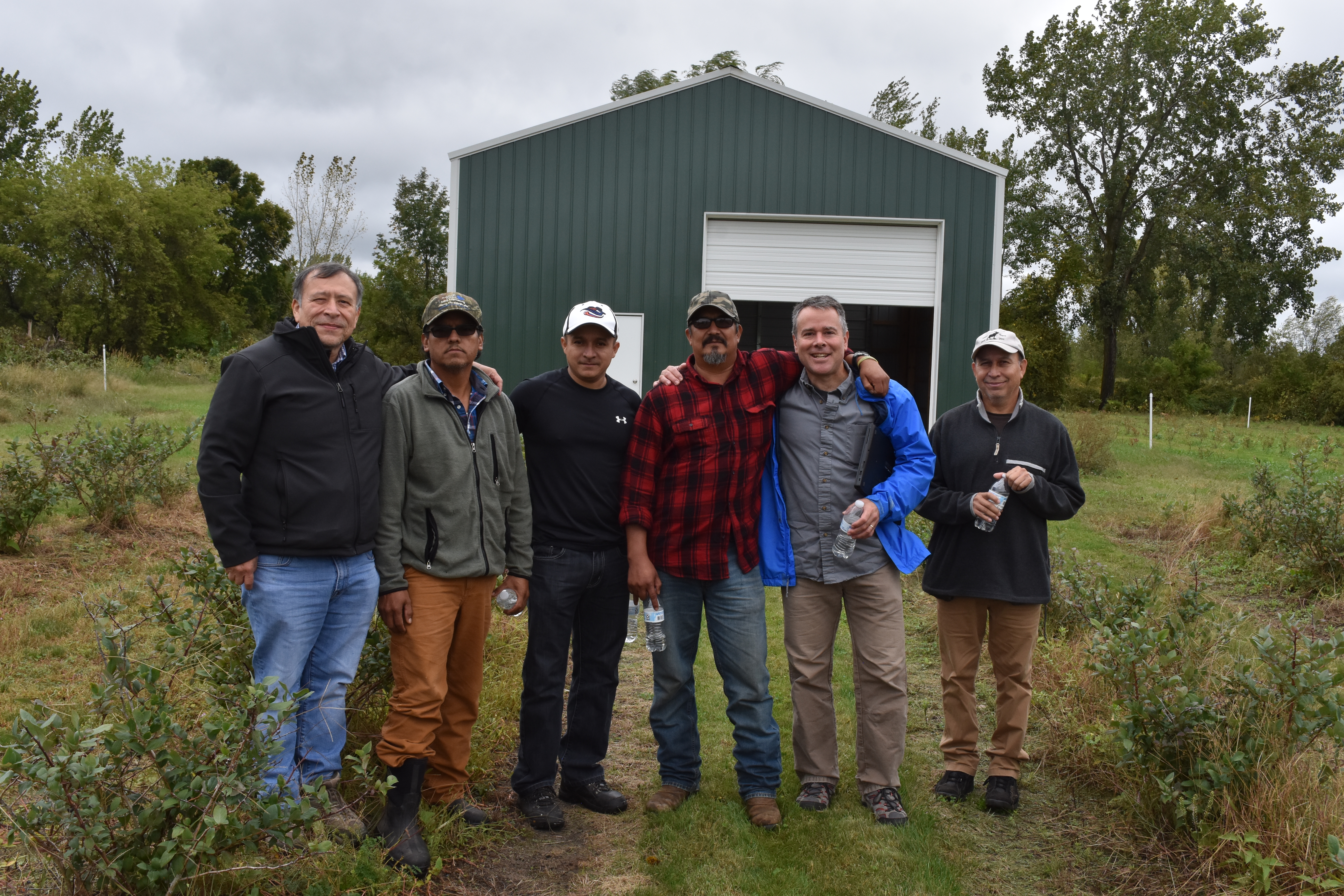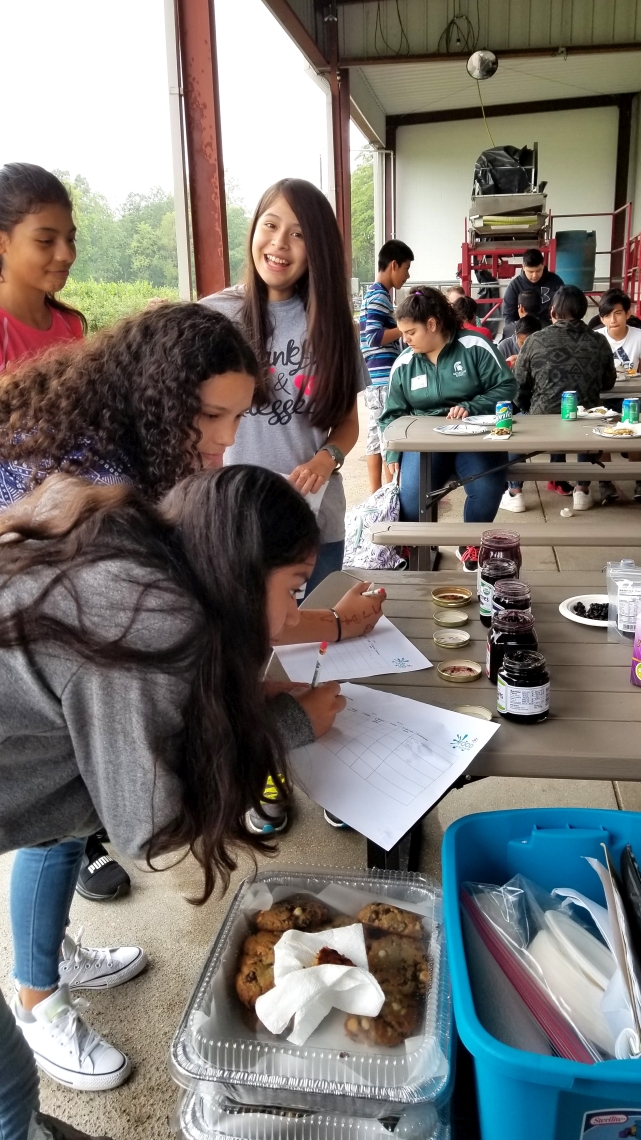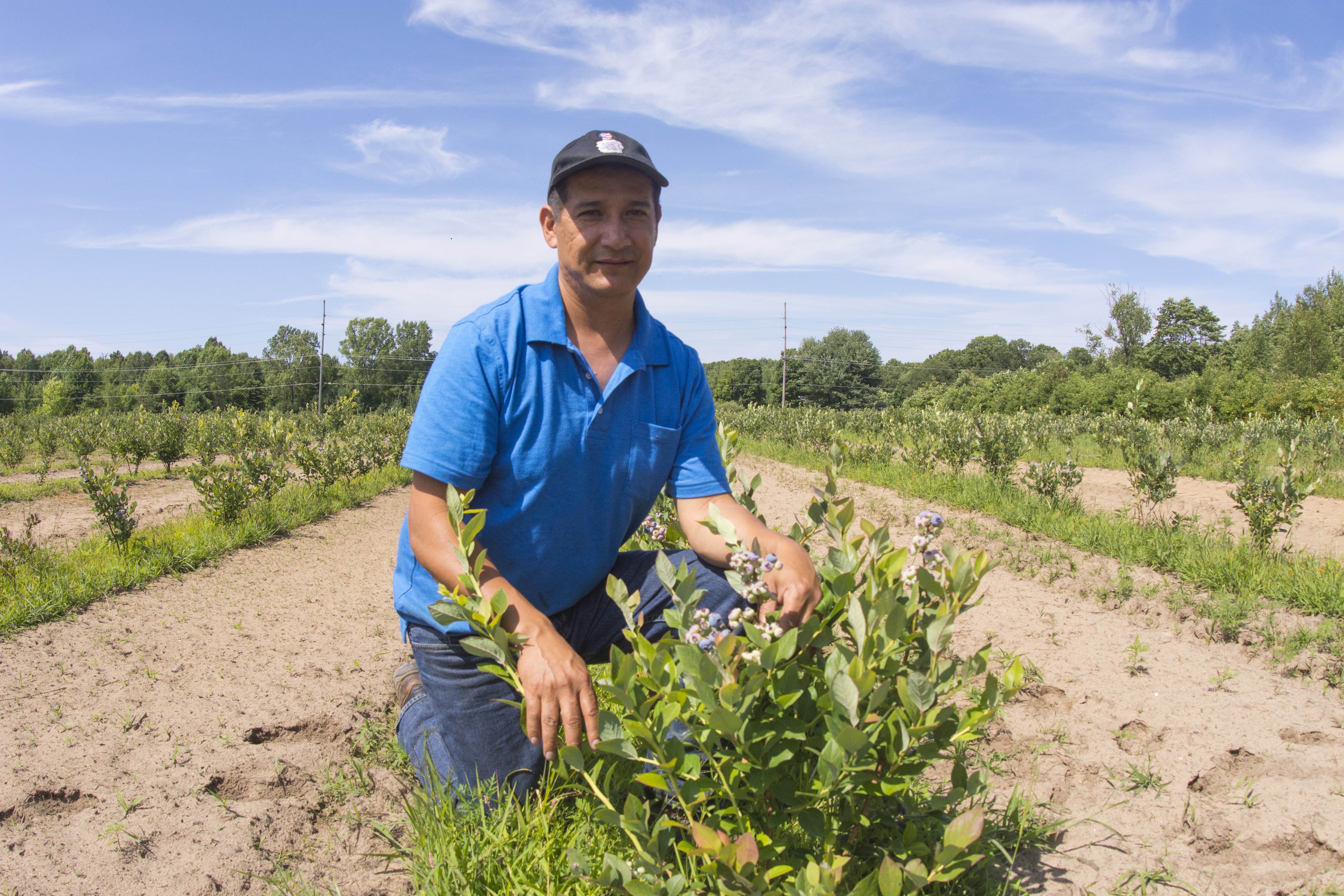La Cosecha (The Harvest): Growing Sustainable Farming Businesses
- David Mota-Sanchez, Ph.D.
- Assistant Professor, Department of Entomology
- College of Agriculture and Natural Resources

David Mota-Sanchez (left) with program participants, Sigifredo Morales, Erik Alcaraz, Jesse Gamino, Layne Cameron (University Communications), and Ramon Villegas.
Photo taken fall semester, 2019.
New farmers attempting to establish a profitable farming business face daunting challenges: a steep learning curve, expensive acreage and equipment, federal and local guidelines, the need for credentials and business savvy, stiff competition, and a declining labor force, to say nothing of pest damage and climate concerns. For Latino/a farmers, these challenges can be intensified by cultural and linguistic barriers. For new farmers to be successful, access to funding and up-to-date information is indispensable.
David Mota-Sanchez, assistant professor in MSU's Department of Entomology, directs La Cosecha, a three-year training program for first and next generation Latino/a farmers, that seeks to help farmers access the resources they need to establish sustainable farms that can potentially be passed to the next generation.
The training program provides a series of workshops in areas of key importance to farmworkers and growers primarily in southwest Michigan, such as blueberry integrated pest management and production, food safety practices, accessing USDA programs, marketing and business, field training, and crop diversification, as well as MSU 4-H programs to introduce Latino/a youth to agriculturally related fields. In 2020, the program added new courses to the curriculum related to packaging and the environment, pollinators, and regional food hubs. "It's a complete package," said Mota- Sanchez. "There are many pieces to have a successful production."
Mota-Sanchez collaborated with Antonio Castro-Escobar, recertification and worker protection specialist with the Michigan Department of Agriculture and Rural Development, to begin planning for La Cosecha. "We wouldn't have been able to get funding for La Cosecha without some preliminary work," explained Mota-Sanchez. "When I met Antonio Castro-Escobar, we started talking and then collaborating with other people, and then started applying for grants."
Cultural and Financial Capital are Key Components

Kids enjoy learning about agriculture at a 4-H camp.
In 2017, Mota-Sanchez and La Cosecha co-directors Luis Garcia, director of MSU Migrant Student Services; John Wise, professor, MSU Entomology; and Donald Kuchnicki, director of community programs at Telamon Corporation, received initial funding for the program as part of a USDA-NIFA national initiative, called the Beginner Farmer and Rancher Development Program. Then, in 2020, they received a new $600,000 grant to expand on the program's success.
According to Mota-Sanchez, incorporating Spanish language and cultural understanding into the curriculum was essential for the program's success. "Maybe half of the people participating in La Cosecha speak Spanish, and about 90 percent of them have a Mexican cultural background. So, when we teach our courses, we do it with a cultural reference that helps them understand the problems."
Another critical component of La Cosecha and prior programs is providing access to funding. "Workshops and training by our Latino/a program in collaboration with USDA program officers resulted in access to funds from zero dollars to about $3 million in USDA grants," said Mota-Sanchez. "And most of these grants were for Latino/a farmers."
By providing access to funding and culturally relevant, up-to-date information, La Cosecha's team hopes to ensure the sustainability of farms for years to come, eventually passing them on to the next generation. Some of the youngest "future farmers" attend camps offered by MSU 4-H as part of La Cosecha. Mota-Sanchez has observed that if children begin hearing about agricultural opportunities at a young age, they are more likely to follow in their parents' footsteps. However, he acknowledges that there are challenges.
"I think one of the issues with the next generation is the physical demand of working in agriculture, especially harvesting," said Mota-Sanchez. "The younger generation, the sons and daughters, see families struggling, and some of them don't want to do farming because they see all the effort involved. And then the other thing is that it's very risky to be a farmer. But despite this situation, there are some who are interested in farming. And that is our objective: to train the next generation. And they are more prepared because they speak English and are more skillful in technology."
A Key Partner Facilitates Trust and Communication
One of La Cosecha's key community partners is Telamon Corporation, an NGO that provides services to many groups, including the migrant and seasonal farmworker community, in early childhood education, workforce and career development, and housing and financial empowerment.
"We have a holistic approach, encompassing all of those details to make sure that we empower the farmworker community," said Salvador Chavez, workforce development specialist at Telamon and supervisor of Telamon's Paw Paw office in southwest Michigan.
His partnership with La Cosecha began in 2018 when he was introduced to Mota-Sanchez and began training a program participant to be an outreach worker for La Cosecha.
Dr. Mota-Sanchez would like to acknowledge these additional partners:
- Omar Alejandro Posos, Ph.D. student, MSU Department of Entomology
- Eva Almenar, MSU School of Packaging
- Pedro Martinez, Van Buren ISD
- Juan Pedro Solorio, Program affiliate
- Esteban Valtierra, Rural Development COLPOS
- Angel Zamora, Telamon Corporation
From MSU 4-H:
- Dixie Sandborn
- Janice Zerbe
From MSU Extension:
- Mariel Borgman
- Florencia Colella
- Ronald Goldy
- Ana Heck
- Mark L. Longstroth
- Phil Tocco
- Benjamin Werling
Because Telamon has been working with the farming community in southwest Michigan for many years, they have built a platform of trust essential for La Cosecha programming to successfully connect with the growers. "La Cosecha relies a lot on one-on-one communication with the growers," said Chavez. "It is not easy for someone to come in with all the certifications to try to work with the individuals who may not have the formal education but who have the hands-on knowledge. Building that trust by having a cultural understanding is important."
According to Chavez, Telamon works with La Cosecha to facilitate the connection with the Latino/a grower community on a daily basis, letting them know about upcoming workshops, answering questions and concerns, keeping up attendance, assisting with applying for local and federal programs, and helping them network with other growers to fully utilize the techniques presented in La Cosecha workshops.
"We have to make sure we communicate in a way that is clear to our growers, so they can understand how this is going to benefit them," said Chavez. "A key component is to really have that support from Telamon, working in conjunction with MSU Extension, to make that click for our growers."
A Grower's Success During COVID
La Cosecha programming is focused primarily in southwest Michigan—Van Buren and Ottawa Counties—where blueberry farming is strong.
Nahun Avalos, a blueberry grower in Covert, Michigan, came to the U.S. from Mexico when he was 17. He now has three children of his own—a son who is a college graduate working as a CPA, a daughter at Harvard, and a son in middle school. He has a full-time job in Chicago but began blueberry farming part time in southwest Michigan in 2006, driving back and forth on weekends. He is a participant of La Cosecha but connected with Mota-Sanchez and Chavez back in 2008.
Avalos said that his first two years of farming were very difficult. He lost a lot of time and money and almost gave up.
"That first two years, when I was selling my blueberries to the big companies, I learned that I didn't have quality blueberries, because I didn't know what to do," said Avalos. "At one point I was about to say, ‘This isn't worth it. I can't get any information.' When I got connected with them [Chavez and Mota-Sanchez], it was a big thing for me because I started learning everything and trusting people who were telling me the truth about how to farm."
By continuing his education with La Cosecha, as well as following weekly updates on the MSU Extension website, he has gained vital knowledge. "When I started learning about spraying techniques and how to keep these blueberries, that's when my business started being successful," he said. "And now my customers really love the quality of my blueberries."
Avalos has also witnessed a correlation between farming and his children's success. "Farming has helped me a lot in creating a new mentality for them," he said. "They really appreciate everything more, and that not everything comes easy. I think that's the number one reason they have been so interested in higher education and farming also."
When COVID first hit in early 2020, Avalos feared what it might mean for him and his family, physically and financially, and almost did not attempt the blueberry farming. But with his family's encouragement, he forged ahead, and 2020 turned out to be a particularly good year for him. "I thought I was going to have a bad year at the beginning. But to be honest, this has been my most successful year," he said. "I had 40 acres, and I added 50 more this year. I doubled my production, and I did it under COVID-19. I had about 50 guys working for me picking blueberries this year, and none of us have been sick."
Avalos credits programs like La Cosecha for helping him be successful and is happy to pass along the information he is learning to other farmers, especially those who do not speak English. "It's a very good program," he said. "It really helps the Spanish community right now. It's a lot of information for us and is wonderful, especially what they're doing in our language. It's a helpful tool."
Farming During COVID

Blueberry grower Nahun Avalos inspects a blueberry bush at his farm in southwest Michigan.
Mota-Sanchez and Chavez agree that, while there have been some opportunities and successes during COVID, there have also been challenges and barriers. Workshops that typically provide hands-on and in-the-field training had to be moved to online formats, which was a barrier to farmers who do not own computers. While they adapted to using smart phones for presentations, with applications such as WhatsApp, it was not ideal. "It's another way to stay connected, and we have to make sure we evolve and develop so that it's a way to disseminate information," said Chavez. "The challenge is that if the other person is not able to connect, it's more of a barrier."
Another coronavirus impact that Mota-Sanchez noted is the labor shortage. "One thing that impacts them is the lack of labor, especially for harvesting," he said. "Nobody wants to be together because there are more restrictions. In general, I think it is definitely impacting the farms. There are many interruptions in many activities."
Success Worth Celebrating...Even if Delayed
The first La Cosecha cohort was set to celebrate its graduation in September 2020, but due to COVID that had to be postponed. "They like to meet face-to-face, but we need to be responsible," said Mota-Sanchez. "Now everyone is isolating because they don't want more cases and we don't want anybody to be infected. But we will reschedule it!"
As an entomologist, Mota-Sanchez has applied his expertise in various capacities all over the world…from Monarch butterfly conservation in Mexico, to pesticide use in corn grains in Ecuador, to work with legume farmers in West Africa. Working with Latino/a farmers through La Cosecha here in Michigan gives him a deep sense of fulfillment.
"I feel a social responsibility to train Latino farmers in Michigan because they are an important part of this community," said Mota- Sanchez. "This is a wonderful population; they are very hard workers. And I see how the university can impact their access to resources. At the beginning I saw that it was going to be difficult. But then they started adopting the technology, and they created networks of people. And I think one thing we accomplished is that the farmers achieved knowledge and they applied this knowledge to their farm. That's the thing that excites me."
(Funding: USDA NIFA BFRDP Award #s [2017-70017-26860] and [2020-49400-32429] Michigan State University)
- Written by Amy Byle, University Outreach and Engagement
- Photographs courtesy of David Mota-Sanchez and Juan Pedro Solorio